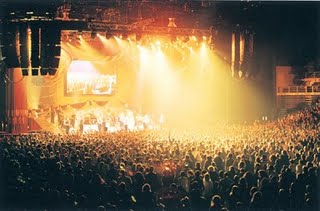What does it mean to be 'Live'? Part 2
What does it mean to be live? Part 2

Following from our previous posts on the 'The Virtual Presenter', “What does it mean to present in the ‘live’ world?”
In this series of blog posts, we’ll take a tour of some of the industries that have already grappled with this question.
2 Music
Talk about comebacks!
The rock concert has seen a Creedence Clearwater Revival of spectacular proportions.
Many of the golden oldies have returned… The Rolling Stones, The Eagles, even Simon and Garfunkel.
What happened?
Were they not content in retirement, living off their record royalties?
May be, may be not.
Whilst recorded music sales have dropped, there has been a rise in the demand for live music.
What happened?
 Let’s take a step back in history and find out…
Let’s take a step back in history and find out… The music industry began with live performances. You just had to be there.
Later, they were complemented by the sales of sheet music.
This was the closest you could get to hearing a maestro at work – learn it and play it yourself.
Then along came the phonograph and the birth of the recording industry.
Through records, cassettes and CDs the music industry literally went in-house.
- Studio recordings dominated live performances.
- You could listen to the results in your own home.
- And, the industry was controlled by the big players. If you're weren't in their chorus, then you weren't going to be seen or heard. As a result, the recording artist - like authors - received only a fraction of the total sales. And, if you didn’t sing to the songsheet that was demanded of you, then the volume was turned down on your music future.
Then along came Napster and iTunes. One cracked the digital code illegally, the other didn’t.
They both helped to break the stranglehold on music held by the big four recording companies.
Performers soon realized the big money was in performing live and selling merchandise.
Kiss are reputed to be earning $50 million from their upcoming world tour.
The sound of music has changed.
It’s now swung back to live performances.
The performers are back in charge! And, back in the money!
Questions
- What sort of experience are you providing for your live audience?
- What's the difference between your recordings and your live performances?
- Are you performing in front of, reciting to or interacting with your audience?
Labels: Keynote, Music, presentations, Speaker, Speaking, Virtual, Virtual Presenter

